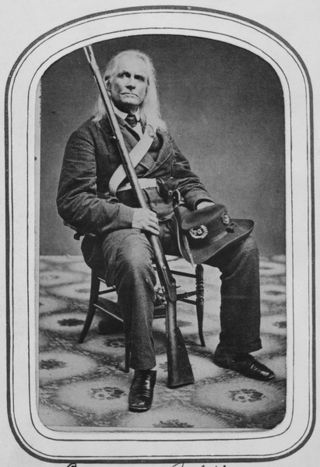JF Ptak Science Books Quick Post ![]()
 I forgot to create a quick post to commemorate the passing of the beginning of the American Civil War, which began with an attack on Ft. Sumter, on Christmas Eve 1867. This Civil War would only take one year to resolve, and this "time" in the favor of the Southern states. This war was fought in the pages of a work of hopeful propaganda, the creation of Edmund Ruffin (1794-1865), a fire-eating State's rights/pro-Slavery Yankee-hater, Anticipation of the Future. The book was published in 1860, just before the start of the true war, and was basically an apology for the political and social positions of the South in general, a way of asserting Southern rights in what he felt would be the war to come. Ruffin thought that war would take a little longer to brew than the one he created in his book, and he had the South triumph in his version, in spite of the obvious shortcomings in manufacturing and trade and manpower and production.
I forgot to create a quick post to commemorate the passing of the beginning of the American Civil War, which began with an attack on Ft. Sumter, on Christmas Eve 1867. This Civil War would only take one year to resolve, and this "time" in the favor of the Southern states. This war was fought in the pages of a work of hopeful propaganda, the creation of Edmund Ruffin (1794-1865), a fire-eating State's rights/pro-Slavery Yankee-hater, Anticipation of the Future. The book was published in 1860, just before the start of the true war, and was basically an apology for the political and social positions of the South in general, a way of asserting Southern rights in what he felt would be the war to come. Ruffin thought that war would take a little longer to brew than the one he created in his book, and he had the South triumph in his version, in spite of the obvious shortcomings in manufacturing and trade and manpower and production.
Ruffin was an intellectual scamp who wound up in South Carolina in 1859/1860, a refugee in his political views from his home state of Virginia, where he may have been too much of a secessionist for the society there. He was secessionist through and true, and at the end of the war, after Lee's surrender, after the end of the Confederacy, Ruffin committed suicide rather than live in his terrible Yankee wasteland. (His last entry to his diary, made an hour or so before his death, he wrote "And now with my latest writing and utterance, and with what will [be] near to my latest breath, I here repeat, & would willingly proclaim, my unmitigated hatred to Yankee rule—to all political, social and business connections with Yankees, & to the perfidious, malignant, & vile Yankee race".)
Ruffin. I don't know really what to make of him, though his importance seems austere at best. There are stories that circulate that establish him as the man who fired the first shot at Sumter in the beginning of the real Civil War. He certainly fired the first shot in his own version of 1860, in his imagination, and fancy. the way I think of him, though, is not the man who did or didn't fire at Sumter and get powder in his hair in 1861, but by is earlier work in agronomy, and particularly in his interest and work on bogs. That's it. Bogs. Or of course manure, as in his work of 1852, An essay on calcareous manures.
The book (the full title being Anticipations of the Future, to Serve as Lessons for the Present Time: In the Form of Extracts of Letters from an English Resident in the United States, to the London Times (sic), from 1864 to 1870) is available at the Internet Archive, here.
Here's a bit of the book, discussing the beginning of the war. Its a difficult read:
This is an interesting section on what would become of the New England and Middle Atlantic states after the war, and their desire to re-join the "great and prosperous body" of the Confederacy:
"As to the predaceous and troublesome New England states, with their pestilent fanaticism, no political community or power will be willing to accept their annexation, by union or allegiance. Greedy as England has always been for territorial acquisition and extended dominion, and anxious to retain even the most costly and unprofitable colonial possessions — even England would now refuse to receive, as a free gift, the voluntary annexation of New England to British America. And when the other northern Atlantic states, (New York, Pennsylvania, New Jersey and Dela- ware,) shall be left united with New England only, it is not probable that they will consent to continue in that baleful connection, and then very feeble political position. These four states, bordering upon the great confederacy of not only the southern but the north-western states, Will doubtless desire to be re-annexed to the great and prosper- ous body, even if yielding, as the necessary condition, all power for the future action of anti-slavery fanaticism. Then New England will be left alone, as it ought to be, without any political associates to rob of their wealth, or to hate and annoy or persecute, because of their diverse opinions, or preferred policy."



Comments